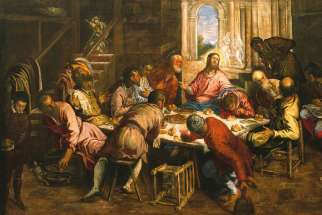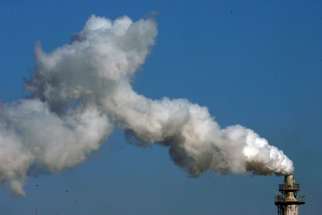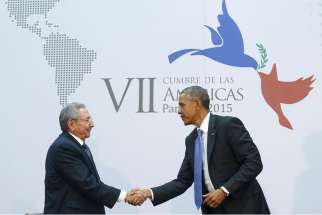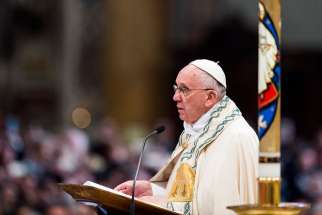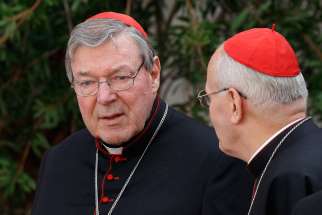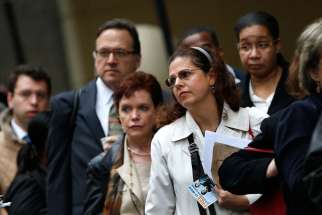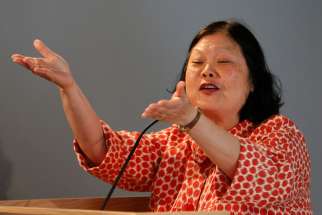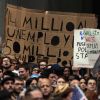VATICAN CITY - Consumers want products that are environmentally friendly, and businesses that are not on board are already starting to feel the pinch, said the CEO of the multinational Unilever.
MILAN - The Holy See's official pavilion at the Milan Expo 2015, the newest edition of the every-five-years world's fair, will be a public space of relaxation and learning.
Put a price on carbon to fight climate change, religious investors tell finance minister
OTTAWA - Religious congregations and faith groups from across Canada have urged Canada’s finance minister to put a price on carbon emissions to combat climate change.
Obama and Castro take next steps to normalize U.S.-Cuba ties
PANAMA CITY - An hourlong meeting April 11 between U.S. President Barack Obama and Cuban President Raul Castro marked the first such personal encounter between the leaders of the two neighbouring countries since 1958.
VATICAN CITY - With an obligation to lead and protect everyone in their nations, government officials cannot be content "to hope that the poor collect the crumbs that fall from the table of the rich," Pope Francis said in a message to the Summit of the Americas.
PORT-AU-PRINCE, Haiti - Bishop Launay Saturne of Jacmel has a simple vision that he believes could change the future of Haiti.
VATICAN CITY - New rules governing the guidance, oversight and control of Vatican financial and administrative activities include the power to levy sanctions and take "civil or criminal action" in cases of "damage to assets," as well as providing protection for whistleblowers raising red flags about "anomalous activity."
VATICAN CITY - Profit must never be a Christian's god, although it is one of the tools for measuring the effectiveness of business choices and the ability of a company to help workers feed their families, Pope Francis said.
Inequity is root of all evil in economies, policies, hunger, Pope says
VATICAN CITY - To find real solutions to today's problems, people need to address the root evils plaguing the world: unjust economies, financial speculation and systems that create inequity, Pope Francis said.
Bishops in Mexico's South: Catholics must change views on migrants
MEXICO CITY - Bishops from Mexico's southernmost dioceses issued a statement calling for Catholics to stop acting indifferently toward the difficulties faced by undocumented migrants, who continue abandoning Central America and taking dangerous trips through Mexico in their attempts at reaching the United States.
Move forward in Cuba
Following half a century of hostility, and guided by the intervention of Pope Francis, the United States and Cuba have agreed to try to become good neighbours. The detente announced between the two nations on Dec. 17 is welcomed news to end a year that witnessed too much hatred.
VATICAN CITY - When Pope Francis condemns a "cult of money" and the "dictatorship" of a faceless economy, he isn't trying to damper entrepreneurial spirit or shutter business.
Economic crisis will bring more suffering, bishops told
Ste. Adele, Que. - In the midst of the worst economic crisis in decades, "there is no miracle cure," a Montreal-based economist told the Canadian bishops Sept. 25.
Governments do not have much leeway to help those affected, though economies that are more flexible will suffer less, Pierre Piché, an expert in international investment and advisor to the Power Corporation of Canada, told the Canadian Conference of Catholic Bishops annual plenary.
“There is not much choice,” Piché told the gathering of more than 90 Canadian bishops. “Either we suffer or we need to adjust. We’re going to suffer even if we adjust.”
The crisis affects the whole world economy, especially its key engines: North America, Europe and Japan.
“It goes really bad when you’re on a plane and you have three of the four engines not working,” he said.
He gave a macro view of the problem through key indicators: unemployment that is more and more structural and composed of people who have been looking for work for a longer time than previously or have abandoned looking for work altogether; sluggish rates of growth; and rising government debt.
Piché said fears of inflation have been replaced by fear of deflation where prices go down in a generalized manner. This explains the behaviour of central banks in trying to pump money into the economy.
“Deflation is horrible,” he said. “It’s very serious because it changes the behaviour of people. When they know prices are going down, they won’t spend. It creates a vicious circle.”
Now there is a cycle where governments and individual households are rejecting a pattern of heavy indebtedness that preceded 2007, he said.
We’re facing what economist John Maynard Keynes called the “paradox of thrift,” he said, noting while it is good and ethically right for households and corporations to be thrifty, “if nobody consumes, then nobody sells anything and everyone goes broke.”
Fr. Bill Ryan of the Jesuit Forum for Social Faith and Justice in Toronto offered a theological reflection on the crisis, pointing out Pope Benedict XVI calls for the logic of profit to be replaced by the logic of gift “that is the opposite of putting a price on everything.”
At the basis is the right relationship we must develop between God and human, among humans and with creation, including a preferential option for the poor, Ryan said, stressing the “essential relationship between faith and justice and justice and evangelization.”
“The whole planet is our neighbourhood and in need of evangelization,” he said, noting the Pope’s social justice encyclical Caritas in Veritate also concerned itself with evangelizing and civilizing the global economy.
Faith and justice cannot be separated, nor can evangelization and justice, he stressed.
Ryan call a “new and global humanism” a “sign of the times,” saying the secular world is coming to a “growing consensus we need a new mindset.”
“Our models and tools are proving inadequate; we seem to be walking with no clear purpose,” he said.
Montreal Auxiliary Bishop Thomas Dowd said the “logic of the gift ties in with our preoccupation with the family.”
“The family is an economic unit, but its internal relations are supposed to be based on the logic of the gift,” he said. “You don’t have kids just because you want someone to look after you in your retirement.”
Families’ internal relationships are becoming “atomized,” he said, and less and less based on the logic of the gift, Dowd said.
“That’s the canary in the coal mine, a sign the whole thing is disordered.”
Ryan said it is important to not always look at big economic structures but at the problems of the small ones. One problem attacking families is the level of family debt which is higher in Canada than elsewhere.
“If we don’t have strength at the bottom,” needed values “won’t come into institutions,” he said.
VATICAN CITY - Economic recovery needs to focus on job creation, especially for young adults, and protecting workers, a Vatican official said.
"The path forward to an effective recovery presupposes a new vision and strategic investments to provide employment and to sustain enterprises," said Archbishop Silvano Tomasi, the Vatican's permanent observer to U.N. agencies based in Geneva.
WASHINGTON - German Cardinal Reinhard Marx called for a "social market economy" in the wake of the fiscal crisis that has gripped much of Europe over the past year.
In a May 30 talk delivered at Georgetown University in Washington, Cardinal Marx, the archbishop of Munich and Freising, said the economy needed to move "beyond capitalism" in order to be more fair.
He added that he was not calling for the abolition of capitalism, saying that capitalism was "an element" in the social market economy he has in mind. But Cardinal Marx suggested that it was the practice of "financial capitalism" in the era since the tearing down of the Iron Curtain that had brought Europe to its crisis point today.



